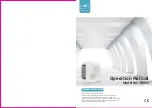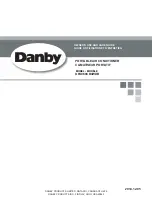
10
•
Recovery equipment and cylinders conform to the appropriate standards.
d) Pump down refrigerant system, if possible.
e) If a vacuum is not possible, make a manifold so that refrigerant can be removed
from various parts of the system.
f) Make sure that cylinder is situated on the scales before recovery takes place.
g) Start the recovery machine and operate in accordance with instructions.
h) Do not overfill cylinders. (No more than 80% volume liquid charge).
i) Do not exceed the maximum working pressure of the cylinder, even temporarily.
j) When the cylinders have been filled correctly and the process completed, make
sure that the cylinders and the equipment are removed from site promptly and
all isolation valves on the equipment are closed off.
k) Recovered refrigerant shall not be charged into another refrigerating system
unless it has been cleaned and checked.
•
Electrostatic charge may accumulate and create a hazardous condition when
charging or discharging the refrigerant.
To avoid fire or explosion, dissipate static electricity during transfer by grounding
and bonding containers and equipment before charging / discharging.
RECOVERY
NOTE:
Refer to the Installation Instructions attached to the outdoor unit.
NOTICE
The English text is the original instructions. Other languages are translations of the original instructions.
01_350115_EU_Eng.indb 10
2023/3/1 13:52:43











































